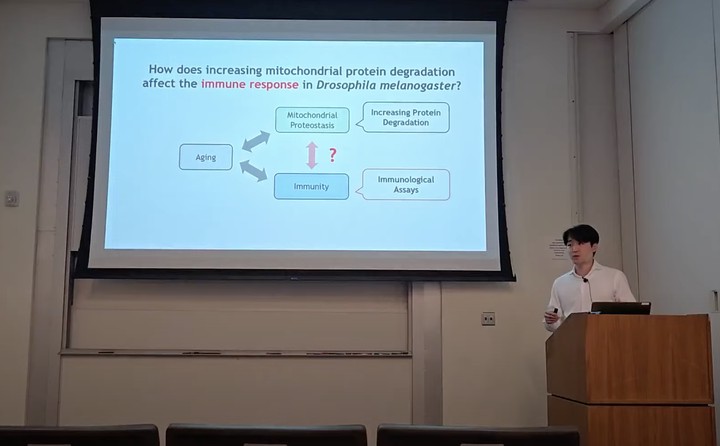 Slide of My Project
Slide of My ProjectSenior Thesis Research, Harvey Mudd College
- Investigated how mitochondrial proteostasis impacts innate immunity in Drosophila under the supervision of Professor Jae Hur.
- Established in-house immunological assays (bacterial load measurements, antimicrobial peptide expression) to test whether ClpXP overexpression enhances pathogen resistance and longevity.
- Conceived and executed the project fully-independently, introducing immunological approaches into a lab focused on molecular genetics of aging, from literature review through experimental design, data collection, and manuscript preparation.
- Awarded the Mindlin Prize for the most creative senior thesis at Harvey Mudd College.
Academic Abstract
Aging, immunity, and mitochondrial protein degradation are all crucial processes for the survival and well-being of organisms. Aging and immunity are closely linked processes, yet the specific role of mitochondrial protein degradation in immune function remains poorly understood. My research seeks to address this gap by examining how increased mitochondrial protein degradation affects the immune response in Drosophila melanogaster. Mitochondrial protein homeostasis (proteostasis) —the maintenance of protein quality within mitochondria—is essential for cellular health and has been associated with extended lifespan and delayed aging in previous studies. Given that aging is also associated with immune decline and chronic inflammation, understanding how mitochondrial protein quality impacts immune function could reveal novel insights into the interplay between aging and immunity. To investigate this, I itilized a Drosophila model overexpressing the mitochondrial protease ClpXP using an RU486-inducible GeneSwitch system. I first optimized and validated bacterial infection, survival, bacterial load, and antimicrobial peptide (AMP) induction assays using Serratia marcescens Db11, a Gram-negative entomopathogen. Using this platform, I assessed whether ClpXP overexpression altered infection outcomes. While robust immune activation was observed following infection, ClpXP overexpression did not significantly affect survival, bacterial clearance, or AMP expression. These findings suggest that improving mitochondrial proteostasis alone does not enhance innate immune resistance under acute infection but may contribute to organismal resilience through other mechanisms linked to aging and cellular stress responses.